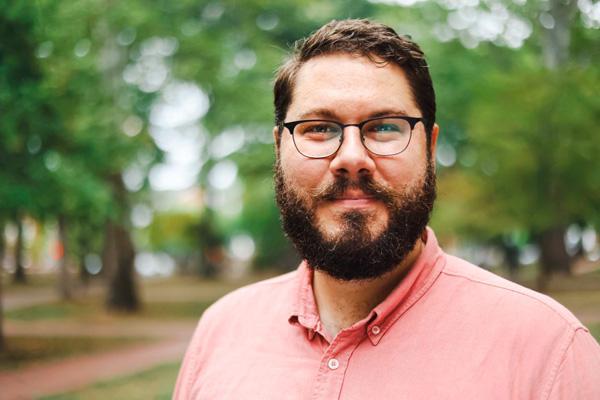
俄亥俄大学历史学博士候选人Klinder, Baker和平研究员
四名历史系研究生是2025-26年当代史研究所克林德奖学金和贝克和平奖学金的获得者。
Emma Stevenson | April 21, 2025
Share:
George Ofori Atta, Jordan Zdinak, Christian McCall and Felix Stossmeister are Ph.D. candidates in the Department of History, having completed all prerequisite coursework and successfully passed their qualifying exams. The award provides fellows with a stipend to support the completion of their dissertations or research.
Ofori Atta and Zdinak have been named the 2025-2026 Klinder Fellows. The Klinder Endowment, established in the 1990s, funds a dissertation writing year for Ohio University doctoral students enrolled in the Contemporary History Institute's certificate program.
McCall and Stossmeister are the 2025–26 recipients of the Baker Peace Fellowship. The John and Elizabeth Baker Peace Endowment supports the Baker Peace Fellowship through the Baker Peace Studies Program, which was established in the 1980s to promote teaching, scholarship, and conferences at Ohio University focused on conflict and conflict resolution. The program provides at least one fellowship annually to a student enrolled in the Contemporary History Institute’s certificate program.
The Contemporary History Institute is proud to continue its support for Ohio University history doctoral students in the research and writing of their dissertations.
George Ofori Atta
George Ofori-Atta’s dissertation, titled “Modernization, the State, and Disaster in Contemporary Ghana: An Environmental History of Accra, c. 1860 to 2015,” examines the impact of natural disasters in Ghana, with a particular emphasis on the urban development of Accra. His research explores catastrophic floods, earthquakes and severe droughts, along with the cultural, political, economic and architectural responses they generated.
Through a combination of archival materials and African oral history sources, Ofori-Atta provides a comprehensive study of the relationship between disaster and the social, economic and political development of modern Ghana. He traces key shifts in disaster management, perception and response over the past three centuries. His research argues that from the 19th century through the late 20th century, reconstruction and relief efforts were shaped by evolving concepts of urban development, capital accumulation and social reform. In the post-independence era, Ghana’s political leadership adopted modernization theories of development with little regard for Indigenous knowledge systems or the vulnerable communities living in environmentally fragile areas.
Ofori-Atta earned a Bachelor of Arts in history from Kwame Nkrumah University of Science and Technology in Ghana in 2018 and a Master of Arts in African studies from Ohio University’s Center for International Studies in 2021. He studies African environmental history under Professor Assan Sarr.

"I have collected all the research and am prepared to dedicate the upcoming academic year to thoroughly analyzing and writing my dissertation chapters." -George Ofori-Atta
Jordan Zdinak
Jordan Zdinak’s dissertation, titled “Violence and Memory: Lynching in the Midwestern United States,” explores the historical evolution of societal responses to lynching from the 1870s through the 1950s and into the present day. Her research examines how American society initially tolerated extrajudicial killings, later came to reject them, and now seeks to memorialize the victims. To illustrate these shifts, Zdinak analyzes themes such as changing notions of Black and white masculinity and femininity, the failure of law enforcement, the reshaping of public narratives about the Black family, and the influence of the media.
“Midwestern racial violence is worth investigating because it is an understudied topic, as most of the historiography focuses on the South and ignores how powerful and widespread ideas of white supremacy were across the United States,” Zdinak said. “Refuting this misconception is a point I will address in the dissertation by focusing specifically on case studies of lynching victims that communities have chosen to commemorate in the Midwestern U.S. My dissertation also advances the idea that addressing past wrongs will enable discussions about present issues of violence perpetrated against Black bodies.”
Zdinak earned a Bachelor of Arts in history from the University of Pittsburgh in 2018 and a Master of Arts in history from Ohio University in 2020. She studies gender and race relations in the United States, with a focus on historical memory, under Professor Katherine Jellison.

"The Klinder Fellowship will allow me the time and opportunity to swiftly write my dissertation and graduate with my Ph.D. in the spring of 2026." -Jordan Zdinak
Christian McCall
Christian McCall’s dissertation, titled “Scorching the Heart of the Mainland: America’s Pacific War Strategic Bombing of Japan’s Chubu Region,” examines the impact of the U.S. strategic bombing campaign on Japan’s Chubu region during World War II. Located in central Honshu, Japan’s largest island, the Chubu region was a critical military-industrial hub. Its largest city, Nagoya, was home to major wartime manufacturers such as Mitsubishi and Aichi Airworks. Surrounding cities housed numerous aircraft parts factories, making the region a prime target for American bombing operations.
He added, “The Baker Peace Fellowship will allow me to complete my dissertation during my final year in the Ph.D. program. Over the past four years, I’ve conducted archival research in both the United States and Japan. My goal is to have draft chapters completed by the start of the fall 2025 semester and to finalize revisions ahead of my spring 2026 defense.”
McCall earned a Bachelor of Science in communications with a focus on news editorial in 2017 and a second B.S. in history in 2019, both from Tennessee Tech University. He received his Master of Arts in history from Austin Peay State University in 2021. He studies American military and airpower history under Professor Ingo Trauschweizer.

"My dissertation seeks to determine the extent to which the strategic bombing of these factories affected Japan’s ability to produce wartime aircraft, and the economic consequences for the Chubu region." -Christian McCall
Felix Stossmeister
Felix Stossmeister’s dissertation, titled “Domestic Visions of American Globalism: The End of the Cold War and the Premature Triumphalism of Democratic Capitalism,” explores U.S. domestic discourse and policymaking surrounding international trade and the formation of a new world order in the post–Cold War era. The project focuses on the administrations of Presidents George H.W. Bush and Bill Clinton, examining the intellectual and policy debates of the time as expressed through think tanks, magazines and influential scholarly works.
Through this lens, the dissertation engages with broader questions of global order, the nature and scope of American power, and domestic responses to globalization, technocracy, efficiency and governance.
“The history of ideas in economic policy is neglected,” Stossmeister said. “But the current upheaval around tariffs as part of a zero-sum approach to international affairs makes it even more urgent to specifically ask: What was it about democratic capitalism that seemed so convincing at the time?"
Building on research conducted at the George H.W. Bush and Bill Clinton presidential libraries, Stossmeister plans to use the fellowship year to integrate those primary sources with existing literature, identifying what is new and what may have been previously overlooked.
Stossmeister earned a Bachelor of Arts in history and political science from Martin Luther University Halle-Wittenberg in 2015 and a Master of Arts in North American studies from Freie Universität Berlin in 2017. He studies American political history, with a focus on trade policy from a domestic perspective, under Professor Paul C. Milazzo.

"Despite announcements concerning the supposed end of history, who disagreed with this broadly shared vision and why? Understanding that may also help shed light on the current moment." -Felix Stossmeister
